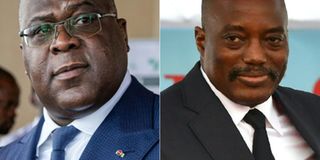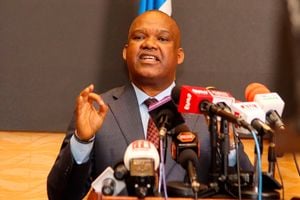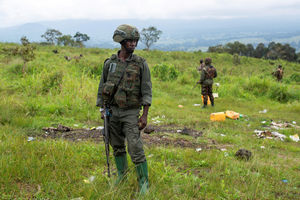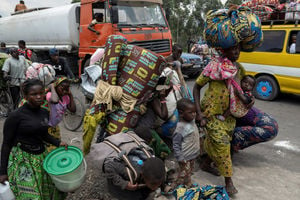
The Democratic Republic of Congo is a big country but centered on two individuals, one who could end up on his political deathbed.
This week, President Felix Tshisekedi suggested his predecessor, Joseph Kabila, was plotting an insurrection against the state. And then the military court sentenced dozens of rebel leaders to hang.
The events appeared unrelated, but officials now suggest they have had a cause-and-effect.
"Joseph Kabila boycotted the elections and is preparing an insurrection. The Alliance Fleuve Congo (Congo River Alliance) (AFC) is him,” Tshisekedi said from Brussels, Belgium, earlier this week.
The declaration provoked comments from all sides, especially at a time when a trial was already underway against 26 AFC and M23 leaders in Kinshasa.
On Thursday, the military court finally sentenced Corneille Nangaa and 25 other M23 and AFC members to death.
The Court handed Corneille Nangaa, the leader of the Alliance Fleuve Congo or Congo River Alliance (AFC), and 25 others, the death penalty for war crimes, treason and participation in an insurrection movement.
His associates, leaders of the M23 rebel group, were handed the same fate. They included the M23 leaders Sultani Makenga and Bertrand Bisimwa and their spokesmen Willy Ngoma and Lawrence Kanyuka.
They were sentenced in absentia, but the Court highlighted their leadership in the rebel alliance in committing what it labelled as crimes against the existence of the state.
The Court said Nangaa and 20 of his associates, including his wife and brother, had led an insurrection and directly participated in activities seen as criminal.
The actual number of those to face the hangman’s noose was 26, but authorities had only arrested five. The other suspects remain at large, some living abroad or still leading the frontline. They have five days to appeal the decision.
For this, Kinshasa was reaching back for a rarely used weapon: death sentence, with which it wants to employ to dissuade rebel groups to lay down arms, a stick of some kind.
But it is also a political move. A few months ago, Augustin Kabuya, Secretary General of the UDPS, the presidential party, had accused the former president of the DRC of being the “real boss of the AFC.” Kabuya even claimed that Kabila had left the DRC “clandestinely.” Senior members of Joseph Kabila’s PPRD party refuted all these allegations, even though the former president himself remained silent.
The former head of state, who is currently living between Namibia and South Africa and pursuing his PhD studies, could now be forced into exile because, as Justice Minister Constant Mutamba says, "we are going to open other public trials against all the major figures involved in the war in our country.”
Mutamba insists that "all those who have links with the bloodthirsty regime in Kigali and especially with the terrorist group M23 and AFC, in any case all of them, with the exception of one person, all those who are going to find themselves in the net of justice, we are going to have to open other public trials so that this will serve as a lesson for all those who decide to betray the republic. There will be no more room for traitors in our country.”
Kinshasa sees M23 as a danger, but it has also accused Rwanda of fueling the group, claims the US and other Western countries have endorsed but are rejected in Kigali.
When journalists asked whether Joseph was among those targeted, the minister, who is also a former member of Joseph Kabila's political family, dismissed the question: “Listen, you can't serve the republic by naming names.”
There is a great deal of uncertainty surrounding the former President's judicial future, however. But Mutamba added: “Here we are talking about all those who are going to find themselves in the case of treason, in the case of participation in insurrectionary movements, in the case of committing war crimes.”
This news about Joseph Kabila comes just a few days after the former president's residence was attacked on 31 July this year in Gombe, a business district of Kinshasa, by a group of individuals identified by some analysts as militants of Félix Tshisekedi's party. According to Olive Lembe Kabila, wife of the former president, who was in the Kinshasa residence at the time of the attack, the assailants wanted to kill her. "They were sent to physically eliminate me.”
Ms Lembe added: “They came in great numbers and wanted to start throwing cocktails to burn all the vehicles outside the plot, with the intention of forcing open the gate and getting inside". "We are going to resist", promised the wife of the former head of state, who at the beginning of August brought together the few leaders who still claim to belong to Joseph Kabila's party.
The UDPS rejected these allegations, claiming that the assailants were not its militants. Even though the courts have ordered the death penalty, Joseph Kabila and his followers have always rejected the idea of going into exile, saying they wanted to live in their own country.
'First peaceful handover'
When Joseph Kabila handed over power to Félix Tshisekedi in January 2019, he was happy to have given the DRC its first peaceful handover of power. It was the first time in the country's history that there had been a living outgoing president and a living incoming president.
The two presidents came together against all the odds, forming a coalition of parties that had once been enemies. But the entente only lasted a few months. The coalition shattered in December 2020, rekindling the rivalry of yesteryear. Today, with the rise in insecurity and the war in eastern Congo, everything has become even more blurred.
Nangaa and his associates have not publicly reacted to the sentencing. But theirs had already been declared a terrorist group meaning they saw it coming.
Nangaa, a former boss of the Congolese electoral commission (CENI) turned rebel, has since taken the route of toppling the government he accuses of mistreating the Congolese. Yet his manouvres abroad have also been limited. When he announced the Alliance in Nairobi, he caused a diplomatic spat with Kinshasa which asked Nairobi to deport him. Kenya declined, citing freedom of speech. The relationship has not been smooth since.
“This is a historic day for all the victims of the war in our country,” Constant Mutamba, the Minister of Justice said after the court decision.
“It is an educational trial against all Congolese who decided to betray the country and serve foreign interests, in this case Rwanda.”
US Sanction
Last month, Washington sanctioned Nangaa and his associates, including close family members for fueling violent conflict and civilian displacement in the Democratic Republic of the Congo (DRC).
The US designated individuals and entities associated with AFC, including former head of the Congolese electoral commission Corneille Nangaa, at a time a trial at the military court in Kinshasa started against him, his relatives and his companions accused of involvement in the rebellion, on July 25.
Nangaa and 24 other people, including his wife and brother, are being prosecuted in absentia (for Nangaa and 19 of his companions) for "war crimes, participation in an insurrectional movement and treason" in the eastern part of the DRC. They face heavy sentences, including the death penalty, if found guilty.
The US said the AFC “have used violence to achieve this political goal, resulting in serious violations of international law that have exacerbated a humanitarian crisis in eastern DRC,” according to the US Department of the Treasury’s Office of Foreign Assets Control (Ofac).








